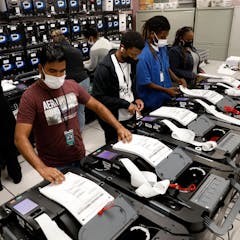
Articles on Lies
Displaying 1 - 20 of 36 articles

If you want to get involved in shady business, find someone who’s loyal − but not ethical.

Artificial intelligence is likely to make the ‘fake news’ problem worse. But it can also be used to help us counter misinformation.

A scholar of political deception says there is something especially deceitful about George Santos, and his success getting elected demonstrates mastery of something more than just pathological lying.

A political philosopher writes that voters may put up with some degree of deception from politicians, but they may not accept being lied to unnecessarily.

Researchers are interested in whether who you’re communicating with and how you’re interacting affect how likely you are to lie.

Financial analysts have a gullibility problem − and the better their reputation, the worse it is.

It’s far easier to throw around accusations of damage to one’s reputation than it is to actually prove it in court. A journalism scholar explains the criteria that must be met.

Most methods for detecting lies actually detect signs of stress – which makes them extremely unreliable.

Kids need to learn when little lies are the right choice. But research suggests parents may not be clear in the messages they send about how they value the truth.

Constituents’ willingness to overlook deception may depend, in part, on whether politicians lie well and with a good purpose.

Lying can be more than just telling a few fibs. It can also be used to communicate social status and make a person appear loyal to a particular group.

For a handful of French writers, the best fiction they wrote was their life story.

Understanding the distinction between bullshit and lying is essential. We can reveal a lie by uncovering the truth, but dealing effectively with bullshit is more complicated.

The UK government is introducing polygraph tests for convicted terrorists on probation.

Post-truth questions the very nature of truth itself – that’s why it’s so dangerous.

When a person or agency backed by the power and resources of the government tells a lie, it sometimes causes harm that only the government can inflict.

Is a 19th-century French author’s cosmic joke turning into a real-life global nightmare?

Ethology, social psychology and criminology can help us understand why humans lie and why scammer scam.

‘They might be a liar but at least they’re honest.’

We know that social media platforms have an incentive to promote whatever gets the most attention, regardless of its authenticity. We’re more reluctant to admit that the same is true of people.
